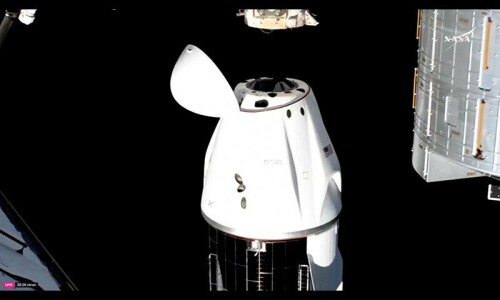SAHIWAL: After a two-month delay, the excavation at the site of the ancient city of Ganweriwala believed to be buried under the Cholistan desert for the last 4,000 to 5,000 years is going to be inaugurated on Thursday (today).
The project is starting after a delay of two months for ‘some technical and security reasons’. Sources said the ongoing jeep rally, the arrival of the Arab guests for hunting of houbara bustard in Cholistan and Thar deserts and the finalisation of modalities between the Department of Archeology and the divisional administration of Bahawalpur were some of the hiccups that caused the delay in excavation.
Muhammad Hasan, the director of archeology, told Dawn a Rs20m grant had already been approved for the excavation. He said all arrangements had been completed for excavation.
The grant was reportedly approved on the initiative of Governor Baleeghur Rehman with joint efforts of culture and heritage expert Dr Sajida Vandal, Bahawalpur Commissioner Ehtasham Anwar and the Punjab Department of Archeology.
About 4,000-year old town along Hakra river was part of Indus Valley Civilisation
The project is being executed by the archaeology department, in collaboration with the Thaap Heritage, led by Sajida Vandal, who is the Unisco consultant on heritage. Thaap has executing Bhatti Gate, Phase I project, in Lahore with the assistance of World Bank in collaboration with the Punjab Walled Cities Authority.
The site of the ancient city of Ganweriwala was discovered by Dr Rafiq Mughal, professor of emeritus at Boston University, USA, in the 1970s. He leads the excavation team along with Saleemul Haq, former DG Archeology, Muhammad Afzal, senior archeologist, Maqsood Ahmed, expert in conservation and artifacts preservation, Muhammad Hasan, director, Dr Sajida Vandal and some faculty members of archeology department from various public universities of Punjab.
Mr Hasan said during the coming two months the archeological excavation along with the preservation of remains and archeological structures and artifacts would be done at Ganweriwala mounds.
Dr Rafiq Mughal said Ganweriwala was buried along the Hakra river bed in Cholistan.

Ganweriwala was probably the third largest city within the Indus Valley Civilisation and it is believed to have been a major centre from 2,600BC to 1,900BC. The Indus Valley Civilisation was a Bronze Age civilisation that, at its zenith, had an estimated population of 5m.
Together with Mesopotamia and Ancient Egypt, it was one of the earliest complex civilisations. Ganweriwala is believed to have followed the typical Indus Civilisation town planning. It had an upper town and a lower town as indicated by the presence of a high and a mound.
Ganweriwala is situated about 60km southwest of Derawar Fort on the dry bed of the Ghaggar-Hakra River, which is now a part of the vast Cholistan desert. Four different sizes of archeological sites have so far been reported by different scholars who visited the site on different occasions.
Dr Nasrulla, the ex-chairman of Seraiki Department, Islamia University Bahawalpur, says the land surrounding the site is inhospitable and unsuitable for cultivation but in the past the region was fed by the Hakra River, making the land fertile and cultivable. The inhabitants were not only growing crops but also involved in animal husbandry.
The extent, size and presence of certain specific features fully qualify the archaeological site of Ganweriwala in the Cholistan desert to be declared as one of the great cities within the Indus Valley Civilisation.
Although the site was discovered in 1975 by Dr Rafiq Mughal, it could not be excavated due to a lack of resources, especially the unavailability of water resources near the site and a sparse population to fulfill the requirement of labour.
Dr Mughal observed the presence of mud-brick walls at the site, similar to those found at other Indus Valley sites. “The surface collection from the site, apart from the pottery, comprises some important antiquities such as unicorns, figurines, a copper seal, and an impressed clay tablet.”
Dr Mughal said for the last two decades, the site had become extremely vulnerable due to development activities in the Cholistan desert. The construction of a jeep track has already divided the area into two parts which was very harmful, Dr Mughal further added.
Dr Sajida Vandal told Dawn the future of the Ganweriwala was not safe until a full-fledged archaeological excavation was conducted at the site and proper fencing of the protected area was executed. “But this (excavation) is the beginning towards a big giant step,” she added.
Published in Dawn, February 29th, 2024













































